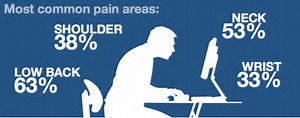Feel like you have been exercising more than ever, but the weight just isn’t shifting?

It’s generally recommended that exercise should be combined with healthy eating to maximise weight loss.
Some people still feel as though they are following this combination, but not getting anywhere. If this is you, maybe you are falling into some of the following mistakes…
- You have a higher caloric intake vs. output (eating mor calories than you burn)
- You are not pushing hard enough when you exercise
- You’re not exercising consistently
- You are trying to “diet” and skipping food groups, meals, or restricting what you eat in a negative way
- You are losing inches but not weight
- You may have a medical condition
Think you can get away with a treat post workout or eat more because you are being more active?
Now this is one of the most common exercise mistakes. Eating more “treats” and “junk food” because you can “afford to” since you are being more active is not ideal and not helpful to your body. Often people tend to consume more calories in general with the thought that they can get away with it as they are exercising more.
Think about it like this: lets say hypothetically, that you have been exercising at a high intensity for an hour and you have burned about 800kcal. An average portion of cheesecake contains an average of 600kcal, a KFC meal contains an average of 1000kcal and a 25g packet of crisps contains an average of 200kcal. Do the maths and you may find yourself soon gaining weight instead of losing it.
Diet matters – you have to think about what you’re putting in your mouth!
Exercise is not the passport to uncontrolled eating. If you want to lose weight just focusing on the exercise side of things is just not going to cut it. If you are consuming 3000kcal a day, there is only so much your body will burn in the time you exercise so don’t expect miracles as sometimes at the best you may be just breaking even.
For best results combine your exercise with healthy & balanced eating. “Diet” is a not always the best word as people associate it with avoiding foods and being strict on what you can eat… but eating healthily tends to be the major aspect of weight loss rather than exercise alone. It does depend on how much weight you are aiming to lose as you may be able to lose a couple of kilos with an extra day in the gym or with just cutting down slightly on your intake.
The healthy eating aspect is not only important if you are overeating. Do remember that you need to be consuming sufficient amount of calories to fuel the exercise. If you participating in a very low calorie diet or a fad diet, exercising is not likely to be wise. Doing so could harm your health or you could actually be getting the opposite results!! Think about it more like this: your diet should provide you with all the necessary nutrients and hydration you need as these aspects are important for your health and also for your weight loss and exercise regime.
You are losing inches but not weight…
Muscle weighs more than fat, fact. If you just rely on the scales you may find that they are not showing any weight change but your clothes may feel more comfortable. What it could be happening is that with exercising you are actually increasing your muscle mass which but you are actually losing some fat and also are getting toned. With exercise your body can change shape, especially as you get more toned. If your weight hasn’t changed massively but your belly is actually going down then there is not cause for concern.
You are not pushing hard enough!
Exercise will need to provide a considerable challenge to your muscles for them to adapt and grow. Introduce variety, increase intensity, or exercise for longer. If you keep doing the same thing your body will adapt and begin to expect what you’re going to do, not providing a challenge, and not changing the body any more.
Be consistent!
Exercising inconsistently can slow your progress down easily. If you exercise 3 times one week, not at all the second, and twice the third week – you’re really not being consistent enough to get those changes you’re after.
Remember that it is recommended to do at least 30 minutes of exercise every day. If you are at a gym or boot camp where you go two to three times a week – that’s great! However, you still need to be doing something every other day as well. It doesn’t need to be the same type of workout or the same intensity – but you do need to be moving and breaking some sort of sweat each day. If you can’t fit in 20-30 minutes, a ten minute jog or power walk around the block is better than nothing!
Keep at it and give it some more time – it doesn’t happen instantaneously!
How long have you been exercising for? If you expect to lose loads of weight in one or two weeks then you may be not be tuned to reality. It does take 2-6 weeks for any exercise fitness gains to come. So yes you may be going to the gym for the past 3 weeks and haven’t noticed massive results apart from the muscle aches. Patience is the answer. Think that everybody is different and any changes in weight loss and fitness will take place according to each individual.
You may find that you lost more weight on the first week and then it reached a plateau. This doesn’t mean that you have to panic and exercise till you drop. It is about giving time. If you are obese you may lose some weight initially, whether be it more water or just your body is not used to the change. However, your body will adapt to any changes and the weight loss process will slow down. Same goes with the fitness increments. If you never walked going for a walk around the block will be a big deal for your muscles but give it a couple of weeks and they are accustomed to it. Also with obesity there a number of hormonal and other changes which have taken place over time. In result there is usually a resistance of the body to lose the weight. Time combined with a correct diet and an appropriate workout plan will do it. It takes time, keep at it!!
Medical or otherwise
If you are doing all the right things with diet and exercise but you are struggling to lose the weight and probably notice that you are putting on weight then it may be good to consult your doctor or a medical professional. There are a number of health conditions which could influence your weight, with thyroid and hormonal imbalances such as menopause being two examples. Apart from health conditions, it could other things such as medication, vitamin deficiencies or dehydration which could lead to excess water retention or other weight related problems.
It is always recommended that you consult an appropriate professional before taking on exercise or a weight loss diet or making any changes on these aspects. Do not hide information from them thinking that it will be too much hassle otherwise. Sometimes the little details which will make the big difference.


